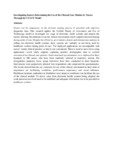Please use this identifier to cite or link to this item:
https://cris.library.msu.ac.zw//handle/11408/1656Full metadata record
| DC Field | Value | Language |
|---|---|---|
| dc.contributor.author | Zhou, Munyaradzi | - |
| dc.contributor.author | Herselman, Marlien | - |
| dc.contributor.author | Coleman, Alfred | - |
| dc.date.accessioned | 2016-07-01T11:55:12Z | - |
| dc.date.available | 2016-07-01T11:55:12Z | - |
| dc.date.issued | 2016 | - |
| dc.identifier.isbn | 978-1-61208-470-1 | - |
| dc.identifier.uri | https://www.researchgate.net/publication/303460293 | - |
| dc.identifier.uri | http://hdl.handle.net/11408/1656 | - |
| dc.description | Paper presented at e-TELEMED 2016 : The Eighth International Conference on e-Health, Telemedicine, and Social Medicine (with DIGITAL HEALTHY LIVING 2016 / MATH 2016), held at Venice, Italy | en_US |
| dc.description.abstract | Nurses can be empowered in the decision making process if provided with objective diagnostic data. This research applied the Unified Theory of Acceptance and Use of Technology model to investigate the usage of electronic health systems and analyse the factors affecting the intention to use the clinical care module which supports decision making during point of care. Despite the efforts by governments, donors and international partners in rolling out electronic health systems, these systems are 'partially' or not being used by healthcare workers during point of care. The deployed applications are incompatible with nurses' routine clinical practice as they're not customized. There is need to move from using applications which solely supports capturing patients' demographic data to systems customized for clinical care practice. Semi-structured questionnaires were deployed in three hospitals to 200 nurses who have been randomly selected in maternity section. For triangulation purposes, focus group interviews have been conducted in these hospitals. Interviewees were purposively selected from respondents who completed the questionnaires. The results showed that the key constructs for use of the clinical care module in their order of importance are facilitating conditions, performance expectancy and social influence. Healthcare institutes authorities in Zimbabwe must improve conditions that facilitate the use of the clinical module. To derive value from electronic health systems being adopted, the work processes involved need to be redefined and adequate information has to be provided to healthcare workers | en_US |
| dc.language.iso | en | en_US |
| dc.publisher | IARIA | en_US |
| dc.relation.ispartofseries | eTELEMED 2016 : The Eighth International Conference on eHealth, Telemedicine, and Social Medicine;p. 186-191 | - |
| dc.subject | - UTAUT; clinical care module; nurses; clinical care | en_US |
| dc.title | Investigating factors determining the use of the clinical care module by nurses through the UTAUT model: Paper presented at e-TELEMED 2016 | en_US |
| item.fulltext | With Fulltext | - |
| item.languageiso639-1 | en | - |
| item.grantfulltext | open | - |
| Appears in Collections: | Conference Papers | |
Files in This Item:
| File | Description | Size | Format | |
|---|---|---|---|---|
| Investigating Factors Determining the Use of the Clinical Care Module by Nurses Through the UTAUT Model.pdf | Abstract | 5.54 kB | Adobe PDF |  View/Open |
Page view(s)
24
checked on Jul 25, 2024
Download(s)
10
checked on Jul 25, 2024
Google ScholarTM
Check
Altmetric
Items in MSUIR are protected by copyright, with all rights reserved, unless otherwise indicated.



